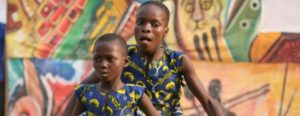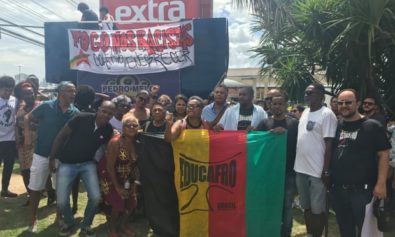
They are celebrating a sacred festival day in honor of Omulu, a deity of life and death. The women wear white dresses with crinolines, colorful belts and headdresses. The men wear lace, pajama-style suits. They sing and dance in a circle for hours; the room gets warmer, the chanting more intense.
Suddenly, they are here: Orixas have possessed the chosen among the faithful. They are spirit gods, the deified ancestors who link humans to the other world.
Those who have been taken over writhe and shout. They are led away and then return dressed in beautiful sparkling costumes depicting the aspect of the deity that possesses them — Omulu, for example, or the snake god Oshunmare.
They are believers in Candomblé, a religion that came to Brazil on the slave ships from of West Africa centuries ago.
Brazil has one of the largest black African populations in the world, . . But these numbers have not translated into power — be it social, economic, political or religious.
Now, though, a sharp uptick in people self-identifying as followers of Afro-Brazilian religions like Candomblé has occurred.
Followers believe in one all-powerful god who is served by lesser deities. Individual initiates have their personal guiding deity, who acts as an inspiration and protector. There is no concept of good or evil, only individual destiny.
Pai, or ‘Father’ Nelson, is the priest of the house of worship where the ceremony is taking place. He says today’s ritual is one of purification. People ask for health, and the deities grant it from one of the four elements of the earth.
“Candomblé was once very hidden, very isolated,” he says. “Candomblé wasn’t accepted here. People always had a preconception about it because it was African — black people aren’t accepted in society here. We do animal sacrifice. Our religion is very different than any other. People didn’t understand it.”
But there has been a recent push to change that. Sitting among the faithful here is Marcilio Costa, who is the commercial officer at a foreign consulate in Sao Paulo. He became an initiate a year and a half ago, and he says he’s open about it.
“Among Brazilians, yes. People understand better now. … All my friends know my religion, every single one of them,” Costa says. “I don’t hide from no one.”
Becoming More Open
In her office at the University of Rio’s Afro-Brazilian Studies Department, Ana Paula Alvez Ribeiro listens to the group Meta Meta, which uses the rhythms and language of Candomblé in its music.
She explains that for some time now, the many Afro-Brazilian religions here have influenced Brazilian musicians and artists. But it’s only in the past few years that adherents of Candomblé have made a push to be more widely recognized in other forums.
“In the census of 2010, there was a big movement within Canmblé called, ‘He who is, say that he is’ — meaning those who practice Candomblé should give that as their religion in the census,” Alvez says.
Candomblé — like its cousin Santeria practiced in Cuba — is a synchretic religion, meaning that many of the orixas are also represented by Catholic saints and it has absorbed many Catholic practices.
Read the entire article here.


